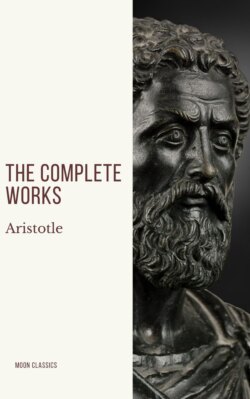Читать книгу Aristotle: The Complete Works - Aristotle - Страница 33
На сайте Литреса книга снята с продажи.
Prior Analytics, Book I Translated by A. J. Jenkinson 1
ОглавлениеWe must first state the subject of our inquiry and the faculty to which it belongs: its subject is demonstration and the faculty that carries it out demonstrative science. We must next define a premiss, a term, and a syllogism, and the nature of a perfect and of an imperfect syllogism; and after that, the inclusion or noninclusion of one term in another as in a whole, and what we mean by predicating one term of all, or none, of another.
A premiss then is a sentence affirming or denying one thing of another. This is either universal or particular or indefinite. By universal I mean the statement that something belongs to all or none of something else; by particular that it belongs to some or not to some or not to all; by indefinite that it does or does not belong, without any mark to show whether it is universal or particular, e.g. ‘contraries are subjects of the same science’, or ‘pleasure is not good’. The demonstrative premiss differs from the dialectical, because the demonstrative premiss is the assertion of one of two contradictory statements (the demonstrator does not ask for his premiss, but lays it down), whereas the dialectical premiss depends on the adversary’s choice between two contradictories. But this will make no difference to the production of a syllogism in either case; for both the demonstrator and the dialectician argue syllogistically after stating that something does or does not belong to something else. Therefore a syllogistic premiss without qualification will be an affirmation or denial of something concerning something else in the way we have described; it will be demonstrative, if it is true and obtained through the first principles of its science; while a dialectical premiss is the giving of a choice between two contradictories, when a man is proceeding by question, but when he is syllogizing it is the assertion of that which is apparent and generally admitted, as has been said in the Topics. The nature then of a premiss and the difference between syllogistic, demonstrative, and dialectical premisses, may be taken as sufficiently defined by us in relation to our present need, but will be stated accurately in the sequel.
I call that a term into which the premiss is resolved, i.e. both the predicate and that of which it is predicated, ‘being’ being added and ‘not being’ removed, or vice versa.
A syllogism is discourse in which, certain things being stated, something other than what is stated follows of necessity from their being so. I mean by the last phrase that they produce the consequence, and by this, that no further term is required from without in order to make the consequence necessary.
I call that a perfect syllogism which needs nothing other than what has been stated to make plain what necessarily follows; a syllogism is imperfect, if it needs either one or more propositions, which are indeed the necessary consequences of the terms set down, but have not been expressly stated as premisses.
That one term should be included in another as in a whole is the same as for the other to be predicated of all of the first. And we say that one term is predicated of all of another, whenever no instance of the subject can be found of which the other term cannot be asserted: ‘to be predicated of none’ must be understood in the same way.
